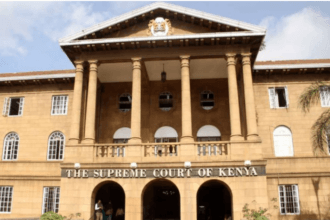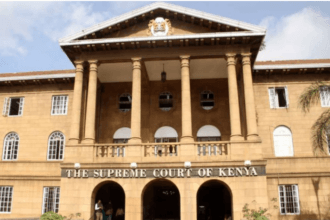
The legal battle intensifying against ousted Deputy President Gachagua is taking a dramatic turn, as his advocates have formally petitioned for the recusal of a panel of three judges—Justices Anthony Mrima, Eric Ogola, and Fredah Mugambi—from presiding over his impeachment case. With the stakes at an all-time high, Gachagua’s team is raising serious questions about the judges’ impartiality, introducing an intriguing twist to this unfolding saga.
During a crucial hearing on Thursday, Gachagua’s attorneys, Kibe Mungai and Ndegwa Njiru, voiced their deep concerns over the neutrality of the judges. The defense specifically brought attention to the professional associations surrounding Justice Eric Ogola, whose wife holds an influential position at the Kenya Water Towers Agency, a role appointed directly by the presidency. Njiru argued that this significant connection ought to have been disclosed at the onset of the proceedings.
“The application highlights that Justice E. Ogola’s wife is employed in the Kenya Water Towers Agency, a position that was assigned via a gazette notice by Cabinet Secretary Soipan Tuya on behalf of the presidency. This crucial detail should have been revealed before the proceedings commenced,” he asserted
Furthermore, Advocate Mungai made a compelling case concerning Justice Mrima’s close ties to Senate Speaker Amason Kingi, a respondent in the case. He pointed out that Kingi had attended Justice Mrima’s wedding, underscoring the nature of their friendship.
Judge Mrima and Senate Speaker Amason Kingi share a very close relationship; the Speaker was present at the wedding and shared photographs with the judge,” Mungai stated
In a striking critique of the judges’ conduct, Njiru recalled a ruling delivered the previous day, where the three-judge panel accused Gachagua’s legal team of trying to intimidate the court and of harboring a biased perspective.
“In yesterday’s ruling, it was evident that the court displayed actual bias towards the petitioners. They faced disparaging remarks that indicated prejudice against them,” he argued.
Njiru went on to assert that the judges failed to consider key arguments put forth by the defense, particularly the critical issue of delegated authority. “When the court expresses that it takes offense to comments made by the petitioners, it suggests that it has become embroiled in the dispute, showing a defensive posture in how the case is being managed,” he said.

Maintaining a stern posture, Njiru stressed the essential qualities a judge should exhibit. “A judge must consistently maintain a solemn demeanor, be slow to anger, and display a good temperament. The comments made by the court seem to position themselves against the petitioners, undermining their confidence in receiving a fair hearing,” Njiru concluded.
Contributing to the growing controversy, Njiru cited a tweet from the well-known attorney Ahmednassir Abdullahi, which hinted at an imminent decision from the judges that could nullify a conservatory order related to the trial.
Senior counsel Ahmednassir, a respected figure in the legal community, tweeted that ‘the conservatory order will be discharged by the three-judge bench by the end of next week, if not by Friday.’ Such statements amplify the perception of a conspiracy against Gachagua, he noted.
Adding his voice to the mounting concerns, Gachagua’s fellow attorney John Khaminwa stated, “I have never lodged a complaint against a judge before. However, if individuals feel strongly that they might not receive justice here, then it may be prudent for them to recuse themselves from continuing with this case.”

As the legal drama unfolds, the implications of these allegations could reshape the trajectory of Gachagua’s impeachment proceedings, highlighting the intricate interplay between law, justice, and perceived impartiality in the courtroom. The advocates’ persistent push for transparency raises critical questions about the integrity of the judicial process, leaving many eagerly anticipating the next steps in this compelling legal saga.




